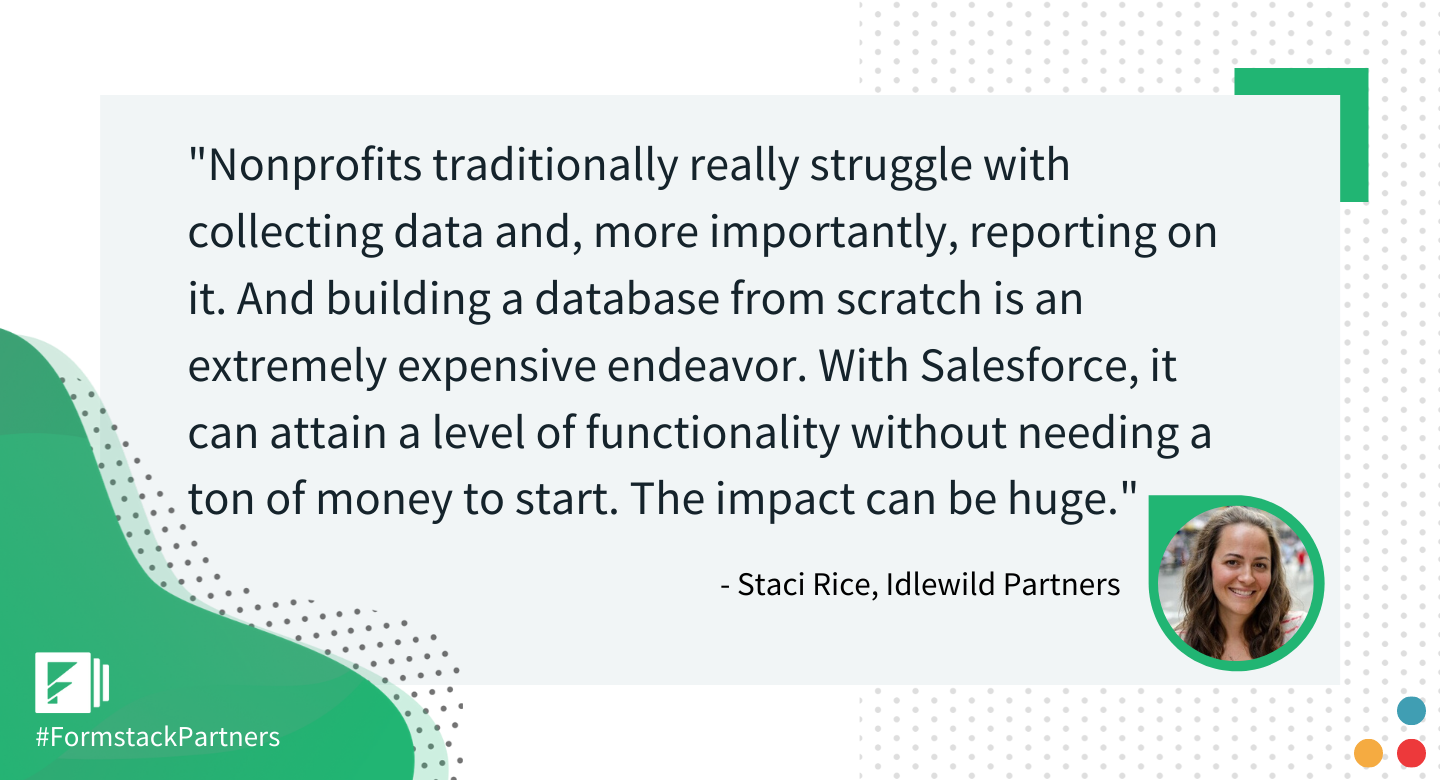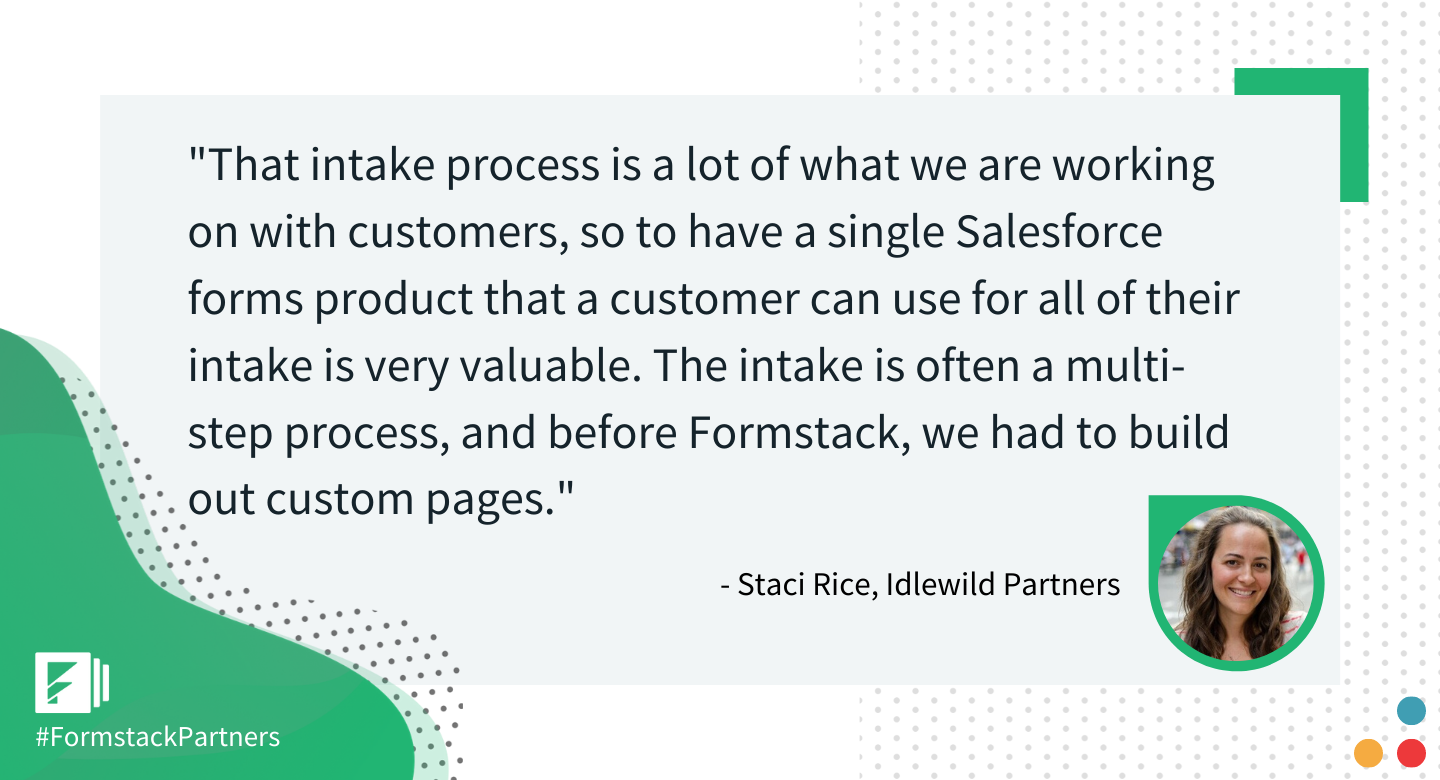Our VP of Partnerships Zak Pines sat down with Staci Rice, CEO of Idlewild Partners, as part of our ongoing Partner Interview Series. Zak and Staci had an engaging conversation that covered Staci’s passion for nonprofit, the “why” behind Salesforce, and how data provides a 360 view into a business. Here’s an abridged transcript of the conversation.
Background on Idlewild Partners
Zak: Can you start by telling me what you do? How do you position your business?
Staci: We are a Salesforce consulting partner, and we do implementations exclusively for nonprofits. I would say 99% of our clients are small and medium-sized nonprofits. We do a lot of human service organizations, school programming, supported employment, membership organizations, legal services, and, of course, fundraising and development across all of those areas. We are currently a team of eight people based in Brooklyn, and all of us come from a nonprofit background.
Zak: For the nonprofits you are working with, do you tend to be geographically focused?
Staci: We have clients all over the place, but I would say we’re primarily in New York City through referrals from clients. And many of our clients like to be face-to-face. I would add that most of our projects can be done remotely. We have clients in DC, Chicago, and now in the Bay Area.
Zak: So you’re specialized in the nonprofit space, which is fantastic. Is that also a space you’ve personally worked in?
Staci: Yes! I was introduced to Salesforce working at a nonprofit during my first job. I came from the for-profit world doing advertising and decided I wanted to do something more meaningful, so I took a job doing fundraising and development at a large, national nonprofit. My first week on the job they decided to roll out Salesfource to 200 people. Since I had database experience in Salesforce, it sort of fell into my lap to be the Salesforce champion for my team.
Zak: Of course it did. You couldn’t have timed that any better.
Staci: I was learning the nonprofit world in Salesforce and actually found a passion for both, which worked out really well. I was there for three years, learned a lot, and got certified. After three years, I decided to go off on my own and start doing this, taking on small clients to start.
It was Staci Rice Consulting for the first few years, and then I realized I needed to hire a team. So I hired my first person, incorporated as Idlewild Partners, and the rest is history. We’ve been growing slowly but steadily over the last five years. It’s really important for us that we bring on people who are passionate about nonprofits. It’s not all about the money, and in some cases, our clients are small and don’t have a huge budget. It’s amazing how much impact you can have by leveraging the 10 free licenses Salesforce provides. And for larger organizations, the ability to use Salesforce as the single system-of-record for donor management as well as program management is critical.
Zak: Where did the name of your company come from?
Staci: That is a really good question. Being in New York City, we were very passionate about nonprofits, but even more so about New York City in general. We love it here. So Idlewild is an old New York name—it was the name of JFK [Airport] before it was renamed—and it kind of conjures up the vast expanse of possibilities that an extensible platform like Salesforce can deliver.
Nonprofits: CRM, Business Process, & Data
Zak: You’re at the intersection of CRM and nonprofit. What does a CRM implementation do for a nonprofit, and why is that the specific opportunity you've focused your career and business on?
Staci: I had been in for-profit my whole life, working in operations and building databases to track for-profit data. Back then, the off-the-shelf databases were clunky and complicated. So when I came across Salesforce at my first nonprofit job, I realized you don’t need a developer or coding skills to actually create something that allows nonprofits to track their data.
Nonprofits traditionally really struggle with collecting data and, more importantly, reporting on it. And building a database from scratch is an extremely expensive endeavor. With Salesforce, it can attain a level of functionality without needing a ton of money to start. The impact can be huge.

The bottom line is that Salesforce consulting is the ideal way for data people to have a big impact on a wide range of nonprofits.
Zak: What is it that connects Salesforce so strongly as the CRM of choice for nonprofits?
Staci: What’s great about Salesforce is that it’s first and foremost a powerful tool built on a flexible platform, available at a huge discount for nonprofits. Salesforce takes the innovation and technology being put into the system by these Fortune 500 companies, and nonprofits get to leverage it at an extremely discounted rate.
Salesforce is able to innovate in the way that for-profit companies can, while other tools that sell exclusively to nonprofits simply don’t have the level of innovation or money to keep up. To me, that’s extremely awesome. No platform in the world can keep up with Salesforce in that way.
Zak: When you are working with a nonprofit to get them up to speed with Salesforce, what are some of the key benefits that you focus on for how it will make an impact on their organization?
Staci: As a nonprofit, there’s huge value in seeing your constituents in one place. They’re doing fundraising and volunteer management and have programs and services that they’re providing to their community, and they often track these things in separate systems.
The participants overlap; oftentimes, there will be a program participant who is also a possible donor with whom you want to get involved and engaged. So your database, your CRM, needs to give you a 360-degree view of all of your engagement.
I always say to clients that having one system where you can go to search for someone and learn their entire history of engagement at your fingertips is a really big thing. Call it the single source of truth, which is hugely valuable.
Zak: As you’re working with customers, what are the common types of processes you are working on helping them automate or improve?
Staci: Very common business processes are in donor management, pipeline management, forecasting, and goal tracking. Setting up goals and tracking progress towards financial goals is a big piece of donor management program management.
Beyond that, there is managing applications, a program admissions process, and tracking constituents and participants through programs.
Zak: Our Salesforce forms product is used to make data collection for Salesforce more efficient. Where do you see opportunity for that to help your customers?
Staci: I knew Formstack years ago before you had the native form builder. So now being able to manage it directly in Salesforce is a game changer.
That intake process is a lot of what we are working on with customers, so to have a single Salesforce forms product that a customer can use for all of their intake is very valuable. The intake is often a multi-step process, and before Formstack, we had to build out custom pages. So now we can set up a multi-step process where they are walked through the flow, with information prefilled. Then when they're done, all the Salesforce records are automatically created or updated.

Zak: Yes, it’s saving time in all areas. The person filling out the form saves time because information is prefilled. And the person managing the process saves time because it’s part of Salesforce and you don’t need to do anything to map or sync data—that part is all automated.
Lightning Round
Zak: Alright, my favorite part. Here’s the lightning round, Staci. Do you have any hobbies?
Staci: Living in New York City, there’s lots to do. My husband and I are big bike riders. We love to ride in the city. You don’t go very fast, but we love the adventure. We also do a lot of museums and take advantage of the cultural stuff in the city. We also spend a lot of time at parks with our two small children.
Zak: Do you have a favorite museum?
Staci: I just recently went back to the Tenement Museum. I don’t know if I’d call it my favorite, but I definitely loved it. It has a lot of culture and history. It’s really fascinating.
Zak: Do you have a favorite TV show?
Staci: We cut television out, but we do stream. I really like “Game of Thrones” and “Breaking Bad.” I’ll go with “Breaking Bad.”
Zak: What’s your favorite productivity tip?
Staci: I would say whatever tool keeps you organized—use it, and be consistent.
Zak: And our final question of the lightning round: Is a hot dog a sandwich?
Staci: Oh, interesting. I don’t think I consider it a sandwich.
Zak: OK. Thank you, Staci. Great chatting, and I’m looking forward to spending time with your team at Dreamforce.
Looking for your next step? Check out Formstack’s partner program for consultants, agencies, and tech partners.












